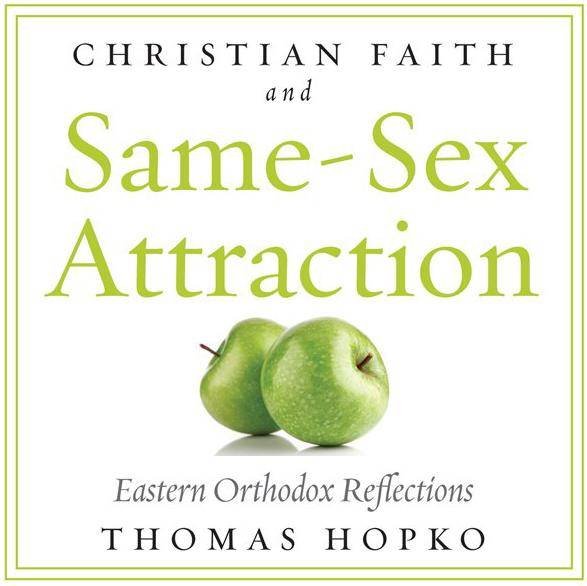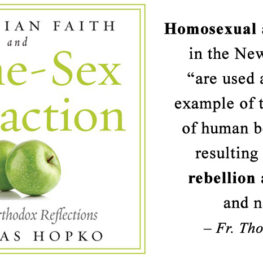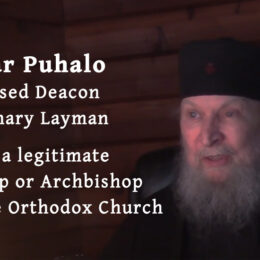OCANews.org | Fr. Thomas Hopko | Dec. 11, 2007
A St. Nicholas Day Reflection
The Orthodox Church’s main hymn (troparion/apolytikion) for the feast of St. Nicholas of Myra is the general hymn for all of the Church’s holy bishops. As such, for example, it is sung the day after the feast of St. Nicholas for the celebration of St. Ambrose of Milan. This hymn tells us what a Christian bishop (and, by extension, also a presbyter) ought to be for his people. And so it also tells us how all Christians should be.
The song begins by telling us that “the truth of things” reveals a real Christian pastor “to his flock” as three things.
First, “the truth of things” reveals the bishop (or presbyter) as a “canon of faith.” This means that the holy pastor incarnates God’s Gospel in Jesus Christ in a living and vital way in absolutely everything he is, says and does. He not only “rightly divides (or distributes) the word of truth” (2 Timothy 2:15), but he himself is a living “rule” and “norm” for everyone about what they should know and believe, and how they should be and behave as Christians.
Second, “the truth of things” manifests the bishop (or presbyter) as an “icon of meekness.” This means that the pastor learns from Christ, the Good Shepherd, who said “learn from me, for I am meek and lowly in heart.” (Matthew 11:29) And having so learned, the pastor becomes a living pattern and image to his people about Christ-like meekness which, according the saints, is a divine quality that no creature can adequately comprehend or explain. This meekness is the ability to express, exemplify and incarnate God’s Gospel in Jesus Christ in a clear, sound, true, sober and gentle manner, without anger, annoyance, irritation or aggression in any way. It is to be and to act like Christ himself: to affirm people’s freedom, to safeguard their dignity and to instruct them by example.
Third, “the truth of things” reveals the bishop (or presbyter) as a “teacher of self-control.” Self-control is how the Greek word enkrateia (in Slavonic vozderzhaniye) is translated into English in the RSV Bible, as, for example, as the final virtue in St. Paul’s listing of “the fruit of the Holy Spirit.” (Galatians 5:22) In the KJV Bible this word is translated as temperance. Sometimes in English translations of ascetical writings the word is rendered as self-discipline or self-limitation, or as abstinence or continence. Sometimes it is rendered as spiritual freedom.
So the Christian pastor is a canon, icon and teacher for his flock. He is a canon of faith, an icon of meekness, and a teacher of self-control.
Two other things are then proclaimed in the hymn about the holy pastor.
The first is that “through humility” the good pastor acquires “high things”. The word humility (in Greek tapeinosis) means lowliness, emptiness, powerlessness according to the flesh. It means that a person has nothing his own: no knowledge, wisdom, power or authority of any kind. Humble people understand that everything is a gift and a grace, and as such, they live by God, and not themselves. They realize that none of their words, actions, powers or properties are their own, to do with as they please. Humble people have the ability to see themselves not merely as the same as everyone else, especially the lowest and weakest, but they view themselves before God as beneath every creature. Thus they are completely devoid of conceit, arrogance, lust of power, vanity, vainglory and pride. The Lord Jesus Christ joined humility (tapeinosis) with meekness, when he said “Learn from me for I am meek and lowly in heart (tapeinos en kardia).”
The second proclamation about the saintly pastor is that “through poverty” he acquires “rich things.” He becomes wealthy in the things of God by emptying himself, without exception, of all things earthly. In this sense the bishop (or presbyter) possesses nothing at all of his own. He is not an owner in any way. He is rather, as Holy Scripture says, a “slave” (doulos), a “servant” (diakonos) and a “steward” (oikonomos).
The word bishop (in Greek episkopos), which literally means overseer or supervisor, was the title in an ancient household (oikos) for the chief slave. The “epi-skopos” was the head servant and first steward who “over-saw” and “super-vised” the work of all the other slaves, servants and stewards. The “episkopos” spoke in the Master’s name, held the Master’s authority, wielded the Master’s power, cared for the Master’s properties, guarded the Master’s possessions, directed the Master’s services and distributed the Master’s goods. But he was not the Master himself!
Thus, in the memorable saying of St. Gregory the Great, the Christian bishop (or presbyter) is the chief “servus servorum Dei,” the preeminent “servant of the servants of God” in the household of God.
In reflecting on the main hymn for St Nicholas and all Christian bishops, we cannot help but recall the words of Holy Scripture about the Church’s bishops and presbyters.
For a bishop (episkopos), as God’s steward (oikonomos), must be blameless, must not be arrogant or quick-tempered or an active alcoholic or violent or greedy for gain, but hospitable, a lover of goodness, master of himself, upright, holy, and self-controlled; he must hold firm to the sure word as taught, so that he may be able to give instruction in sound doctrine and to confute those who contradict it. (Titus 1.7-9; See Also 1 Timothy 3:1-13, 4:11-16)
So I exhort the elders (presvyterous) among you, as a fellow elder (sympresvyteros) and a witness (martys) of the sufferings of Christ as well as a partaker in the glory that is to be revealed. Pastor the flock of God that is in your charge, exercising the oversight (episkope) not by constraint but willingly, not for shameful gain but eagerly, not as domineering over those in your charge but being examples (typoi) to the flock. And when the Chief Shepherd (archpastor/archipoimenos) is manifested you will obtain the unfading crown of glory. (1 Peter 5:1-4)
The hymn to St. Nicholas, and to all holy bishops, concludes with the plea: “O Father Hierarch Nicholas, pray to Christ our God that our souls may be saved.” “The truth of things” on this holy day clearly reveals what God wills for us, and for our Orthodox Church in America, for our souls to be saved.
Fr. Thomas Hopko
St. Nicholas Day, 2007
. . . more



